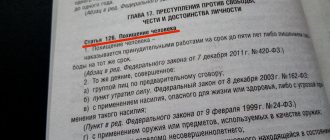ST 127 of the Criminal Code of the Russian Federation.
1. Illegal deprivation of a person’s freedom, not related to his abduction, is punishable by restriction of freedom for a term of up to two years, or forced labor for a term of up to two years, or arrest for a term of three to six months, or imprisonment for a term of up to two years. .
2. The same act committed: a) by a group of persons by prior conspiracy; b) has become invalid; c) with the use of violence dangerous to life or health; d) using weapons or objects used as weapons; e) in relation to a known minor; f) in relation to a woman who is known to the perpetrator to be pregnant; g) in relation to two or more persons - is punishable by forced labor for a term of up to five years or imprisonment for a term of three to five years.
3. Acts provided for in parts one or two of this article, if they were committed by an organized group or caused by negligence the death of the victim or other grave consequences, are punishable by imprisonment for a term of four to eight years.
Commentary to Art. 127 Criminal Code
1. The objective side is characterized by actions to deprive the victim of the opportunity to freely, of his own free will, move in space and determine his place of stay. A distinctive feature of unlawful deprivation of liberty from kidnapping is the absence of movement, i.e. a person is kept in the place where he was of his own free will.
The method of committing a crime does not affect qualifications, except in the case of the use of violence dangerous to life or health (clause “c” of Part 2 of Article 127 of the Criminal Code).
2. The law indicates the illegal nature of deprivation of liberty. In the case of legal deprivation of liberty (for example, a minor based on his interests; with the consent of the victim; as a measure of state coercion, etc.) criminal liability under Art. 127 of the Criminal Code is excluded.
3. The elements of the crime are formal, the crime is considered completed from the moment of actual deprivation of liberty, regardless of the duration of the victim’s detention (in this case, it is necessary to take into account the provisions of Part 2 of Article 14 of the Criminal Code, which can be applied in the case of short-term deprivation of liberty).
4. Qualifying signs (Part 2 of Article 127 of the Criminal Code) and special qualifying signs (Part 3 of Article 127 of the Criminal Code) coincide with similar signs of kidnapping. The exception is the absence of an indication in parts 2 and 3 of Art. 127 of the Criminal Code for selfish motives, as well as paragraph “c” of Part 2 of Art. 127 of the Criminal Code, which involves deprivation of liberty using only physical violence, including infliction of light and moderate harm to health. Accordingly, mental violence is covered by Part 1 of Art. 127 CC.
Illegal retention of someone else's property article and liability
First you need to understand what illegal retention of someone else's property is - this is the illegal appropriation of objects or things belonging to one owner by another person. An example of unauthorized retention of property is the reluctance of a tenant to leave an apartment for which the lease has expired.
The legislator has not provided a specific norm for this offense, but offers several options for punitive measures for the crime:
- Art. 160 "Assignment". This article states that if a citizen has illegally appropriated things or an object that belongs to another person by right of ownership, then this is appropriation;
- Art. 330 "Arbitrariness". This rule applies when actions are committed that are contrary to the law. These actions are carried out willfully, without asking anyone for permission.
The investigator decides what standard to impute. The presiding judge has the right to reclassify the crime if he considers that there is insufficient evidence according to the imputed norm.
Illegal retention of someone else's property is a protracted crime. Liability arises when a thing or object is in the use of someone other than the owner for a certain time. This time is not established by the legislator, but it is customary to count it from the moment the victim contacts the justice authorities.
More often, such offenses are punishable by a fine, but the presiding officer has the right to impose a more serious punishment - correctional labor or imprisonment.
If a crime qualified under Art. 160 of the Criminal Code of the Russian Federation, the legislator provides for the following types of punishment:
- a fine of 120 thousand rubles;
- mandatory work. The maximum amount of work is 240 hours;
- correctional labor lasting six months;
- imprisonment for a period of 2 years.
The severity of punishment is determined by criminal law depending on the classification of the crime.
If there are aggravating circumstances, then a more severe punishment is imposed.
Such circumstances are considered:
- commission of a crime by a group of persons in conspiracy;
- causing damage in the amount of more than 2,500 rubles;
- appropriation of movable or real estate through official position. Moreover, if the damage was caused in the amount of 250,000 or more;
- the illegal act was carried out by a group of persons, the damage from the crime is 1,000,000 rubles or more.
These circumstances only aggravate the situation of the accused.
If the crime is qualified as arbitrariness, then the following sanctions are applied:
- fine;
- mandatory work;
- correctional work;
- forced labor;
- imprisonment.
The type of sanction is determined by the presiding officer according to the degree of punishment.
Any illegal act is qualified in accordance with established legislation, and the legislator has provided for mandatory punishment for violation of established norms.
Second commentary to Art. 127 of the Criminal Code of the Russian Federation
1. The direct object of the crime is social relations that ensure the human right to freedom of movement.
2. The act consists of illegally depriving a person of freedom of movement in the place where he was already located (of his own free will or under duress from other persons not in conspiracy with the perpetrator). The crime is over from the moment the victim is actually deprived of freedom of movement, regardless of the duration of the detention.
This crime is less dangerous than kidnapping, since the person deprived of his liberty is not held in specially created conditions (as is the case with kidnapping), but in the place where he, as a rule, was of his own free will.
3. The subjective side is characterized by direct intent.
4. The subject of the crime is a person who has reached the age of 16 years.
5. The content of the qualifying features corresponds to the content of the qualifying features of kidnapping, however, selfish motives in part 2 of Art. 127 of the Criminal Code are not provided for.
Illegal deprivation of human freedom concept and content
my daughter is 17 years old. She is dating a young man 2 years older than her. We live in different cities. She studies at the institute in the city where he lives. My husband and I are not against their relationship. During the summer holidays, they went to visit each other, he came to us, she went to him, and stayed overnight at each other’s houses. I don’t have old views and I understood perfectly well that their relationship had long been more than just friendly... In general, they accepted him as their own son... Yes, I understood that on the other side they were not against it either. Once again, they let her visit him without any bad thoughts (they went to each other in turns, then he came to us, then after a while she went to him). I left on Friday evening and was going back on Sunday evening. Everything seems to be fine, on Saturday I called to find out how my child is doing, he doesn’t answer the phone, calls back from his phone, says that everything is fine and will arrive on Monday morning, I was a little surprised, well, I think okay... He arrives on Monday all covered in bruises and abrasions When I ask what happened, her answer shocked me. It turns out they had a fight on Saturday and she got ready to go home, he took all her things away from her, beat her with her cell phone, threatened that if she told anyone, she would die. I can’t understand where his mother and two brothers and stepfather were at that time, but the fact is that she was screaming and no one left to help her... I decided to contact his mother and find out everything, on which she poured a bunch of dirt and on me and on my child. My husband went to see him at work, but he hid in the cabin and didn’t come out. Tomorrow we are going to film the beatings, there are not many bruises, but they are there... The daughter says that this is not the first time he has had a conflict out of jealousy and out of nowhere, she has not given any reason... What article does he face?
Kidnapping
Unfortunately, this type of criminal activity is not uncommon. Moreover, such crimes are carefully planned long before they are committed and are almost never committed alone. It often happens that a kidnapped person knows his abductors by sight, which leads to sad consequences: in order to cover up traces and eliminate eyewitnesses, the victim is deprived of his life.
The very concept of “kidnapping” is more fully disclosed in theory than in criminal law - this term is not in Article 126 of the Criminal Code of the Russian Federation. Kidnapping (it can be either secret or open) is characterized by active actions of the participants, since the nature of the crime implies the capture of a person and moving him to another place where he is planned to stay for a certain time.
The classic kidnapping is the following example: A.V. Davydov, who unsuccessfully demands the return of the borrowed 500,000 rubles from V.V. Rebrov, decides to kidnap his son, the minor A.V. Rebrov. To do this, he agrees with his acquaintance P.R. Utesov, who has a car, to kidnap a child from the school and take measures to obtain a ransom of double the amount - 1 million rubles, 20% of the amount A.V. Davydov. promises accomplice V.V. Rebrov. Since Rebrov’s son V.V. knows Davydov A.V. personally. as a family friend, he has no fears about the “unexpected” meeting of him near the school, he voluntarily gets into the approaching car, after which Davydov A.V. and Utesov P.R. They take the child to a pre-rented apartment on the outskirts of the city, where they live for three days. During this time, the kidnappers periodically call the minor's father and demand a million rubles under the threat of causing the kidnapped person's death.
In this situation, we see typical signs of kidnapping within the meaning of criminal law:
- A man is captured against his will by intruders.
- The victim is moved to another location and held there.
It should be noted that in most cases, the actions of criminals are also qualified under other articles of the Criminal Code of the Russian Federation, since kidnapping alone without further intentions is rarely committed. Thus, in the above example, the actions of the perpetrators fall under the signs not only of Art. 126 of the Criminal Code of the Russian Federation, but also extortion with threats of violence.
The article in question contains a fairly large number of additional features provided for by the legislator in part two:
- when a crime is committed by several persons (by prior agreement, with the distribution of roles and a clear definition of the degree of participation of each);
- with violence or threats of its use (this is the symptom that most often “accompanies” the kidnapping of a person, since it serves as a way to suppress the resistance of the victim);
- when they use weapons or any objects instead of them (bats, sticks, clubs, etc.);
- if the weakest representatives of humanity are kidnapped: children, pregnant women;
- when the kidnapping is carried out against several (more than two) persons;
- if the motive for committing a crime is selfish.
These additional signs give the right to increase the punishment from five years of imprisonment (“simple kidnapping”) to twelve .
In addition, if the actions are committed by a criminal group or the victim died (due to negligence), then the perpetrator may be sentenced to 15 years of isolation .
How to return property
Judicial practice says that a violator cannot avoid punishment for misappropriation or arbitrariness. It does not matter who acts as a plaintiff - the contractor or the lessor. If the action taken is unlawful, the presiding judge will consider the claim and return the property to the legal owner.
To return real estate or movable property, you need to contact a consultant who will help you file a claim. The lawyer always has a sample application at hand
It is important to accurately provide information to the defender so that he can correctly build the right line of defense.
First, you need to contact law enforcement agencies: the police and write a statement about illegal retention of property. The police are obliged to accept the statement and help the victim.
More often, such cases are resolved by filing a civil lawsuit in court. The claim is sent to the court at the place of residence of the person accused of committing an unlawful act. After filing a claim, it is recommended to pay a state fee, the amount of which is determined by the value of the required property.
To obtain a receipt for payment of the duty, you should go to court. The receipt is needed to provide details when paying the state fee. The check order is attached to the application of the injured party and sent to the presiding officer.
In order for the court to be on the side of the victim, it is necessary to present evidence confirming ownership rights:
- pink certificate confirming ownership of real estate;
- vehicle passport for cars and other vehicles;
- deed of gift and other papers.
If there are these papers, the court will issue a decision to return the illegally appropriated property to the owner and pay a fine or order work.
It is important to correctly draw up a statement of claim and provide truthful information regarding illegally appropriated or retained property. Otherwise, if false information or false accusations are provided, the injured party is subject to punishment.
If a crime is reclassified from criminal to administrative, the Code of Administrative Offenses provides for the following types of sanctions:
- Warning.
- A fine of 100 to 500 rubles.
These sanctions are sometimes applied together. It depends on the judge's decision.
Punishment and responsibility
- If there are no qualifying signs, then the court can limit the freedom of the perpetrator, send him to forced labor and even imprisonment. In all cases, the period is within two years. Arrest is also possible (from three to six months).
- If qualified under the second part of Article 127, the period of forced labor increases to five years. Imprisonment can be calculated from three to five years.
- Finally, the only type of punishment - imprisonment - is assigned when qualified under the third part of Article 127. The period lasts between four and eight years.
Read on for examples from judicial practice on unlawful deprivation of liberty.
How to avoid charges of unlawful retention of someone else's property
When using property that is not owned by right of ownership, you must do the following in advance:
- Discuss in advance with the owner the nuances of use in the presence of a reliable witness who is ready, if necessary, to confirm the terms of the agreement in court.
- Draw up a bilateral agreement that specifies the rights, obligations, terms of payment and use of the property (if this is an agreement between the tenant and the landlord or the customer and the contractor) and other points.
- Sign the drawn up agreement.
- Leave each other alternative means of communication in case of emergency.
The listed stages of the transaction are mandatory; this will help preserve the relationship between the parties.
The drawn up agreement does not have to be notarized, since such transactions can be equated to everyday ones. If you cannot draw up an agreement on your own or there is no opportunity, you should contact a lawyer.
The consultant will help you draw up an agreement correctly and point out any missing points. The only negative is the paid service. If you don’t want to pay a lawyer, then you should try to draw up a contract yourself. A sample agreement should be found on the Internet and printed in duplicate, having entered in advance the unspecified details of the transaction.
An agreement, the subject of which is of a property nature, is also necessary if an unfamiliar person asks for a service. Such reinsurance will protect you from litigation and will allow you to maintain relationships between people after the service has been provided.








